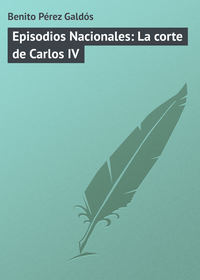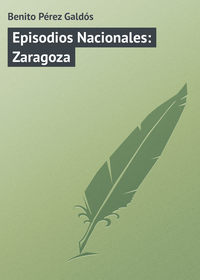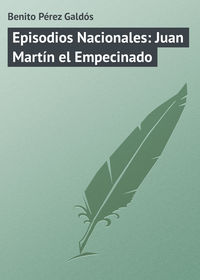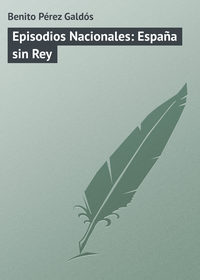 полная версия
полная версияDona Perfecta
Licurgo, full of humility, answered:
“This is yours.”
“I see that all the poor land is mine,” declared the young man, laughing good-humoredly.
As they were thus conversing, they turned again into the high-road. The morning sunshine, pouring joyously through all the gates and balconies of the Spanish horizon, had now inundated the fields with brilliant light. The wide sky, undimmed by a single cloud, seemed to grow wider and to recede further from the earth, in order to contemplate it, and rejoice in the contemplation, from a greater height. The desolate, treeless land, straw-colored at intervals, at intervals of the color of chalk, and all cut up into triangles and quadrilaterals, yellow or black, gray or pale green, bore a fanciful resemblance to a beggar’s cloak spread out in the sun. On that miserable cloak Christianity and Islamism had fought with each other epic battles. Glorious fields, in truth, but the combats of the past had left them hideous!
“I think we shall have a scorching day, Senor Licurgo,” said the young man, loosening his cloak a little. “What a dreary road! Not a single tree to be seen, as far as the eye can reach. Here everything is in contradiction. The irony does not cease. Why, when there are no poplars here, either large or small, should this be called The Poplars?”
Uncle Licurgo did not answer this question because he was listening with his whole soul to certain sounds which were suddenly heard in the distance, and with an uneasy air he stopped his beast, while he explored the road and the distant hills with a gloomy look.
“What is the matter?” asked the traveller, stopping his horse also.
“Do you carry arms, Don Jose?”
“A revolver—ah! now I understand. Are there robbers about?”
“Perhaps,” answered the peasant, with visible apprehension. “I think I heard a shot.”
“We shall soon see. Forward!” said the young man, putting spurs to his nag. “They are not very terrible, I dare say.”
“Keep quiet, Senor Don Jose,” exclaimed the peasant, stopping him. “Those people are worse than Satan himself. The other day they murdered two gentlemen who were on their way to take the train. Let us leave off jesting. Gasparon el Fuerte, Pepito Chispillas, Merengue, and Ahorca Suegras shall not see my face while I live. Let us turn into the path.”
“Forward, Senor Licurgo!”
“Back, Senor Don Jose,” replied the peasant, in distressed accents. “You don’t know what kind of people those are. They are the same men who stole the chalice, the Virgin’s crown, and two candlesticks from the church of the Carmen last month; they are the men who robbed the Madrid train two years ago.”
Don Jose, hearing these alarming antecedents, felt his courage begin to give way.
“Do you see that great high hill in the distance? Well, that is where those rascals hide themselves; there in some caves which they call the Retreat of the Cavaliers.”
“Of the Cavaliers?”
“Yes, senor. They come down to the high-road when the Civil Guards are not watching, and rob all they can. Do you see a cross beyond the bend of the road? Well, that was erected in remembrance of the death of the Alcalde of Villahorrenda, whom they murdered there at the time of the elections.”
“Yes, I see the cross.”
“There is an old house there, in which they hide themselves to wait for the carriers. They call that place The Pleasaunce.”
“The Pleasaunce?”
“If all the people who have been murdered and robbed there were to be restored they would form an army.”
While they were thus talking shots were again heard, this time nearer than before, which made the valiant hearts of the travellers quake a little, but not that of the country lad, who, jumping about for joy, asked Senor Licurgo’s permission to go forward to watch the conflict which was taking place so near them. Observing the courage of the boy Don Jose felt a little ashamed of having been frightened, or at least a little disturbed, by the proximity of the robbers, and cried, putting spurs to his nag:
“We will go forward, then. Perhaps we may be able to lend assistance to the unlucky travellers who find themselves in so perilous a situation, and give a lesson besides to those cavaliers.”
The peasant endeavored to convince the young man of the rashness of his purpose, as well as of the profitlessness of his generous design, since those who had been robbed were robbed and perhaps dead also, and not in a condition to need the assistance of any one.
The gentleman insisted, in spite of these sage counsels; the peasant reiterated his objections more strongly than before; when the appearance of two or three carters, coming quietly down the road driving a wagon, put an end to the controversy. The danger could not be very great when these men were coming along so unconcernedly, singing merry songs; and such was in fact the case, for the shots, according to what the carters said, had not been fired by the robbers, but by the Civil Guards, who desired in this way to prevent the escape of half a dozen thieves whom they were taking, bound together, to the town jail.
“Yes, I know now what it was,” said Licurgo, pointing to a light cloud of smoke which was to be seen some distance off, to the right of the road. “They have peppered them there. That happens every other day.”
The young man did not understand.
“I assure you, Senor Don Jose,” added the Lacedaemonian legislator, with energy, “that it was very well done; for it is of no use to try those rascals. The judge cross-questions them a little and then lets them go. If at the end of a trial dragged out for half a dozen years one of them is sent to jail, at the moment least expected he escapes, and returns to the Retreat of the Cavaliers. That is the best thing to do—shoot them! Take them to prison, and when you are passing a suitable place—Ah, dog, so you want to escape, do you? pum! pum! The indictment is drawn up, the witnesses summoned, the trial ended, the sentence pronounced—all in a minute. It is a true saying that the fox is very cunning, but he who catches him is more cunning still.”
“Forward, then, and let us ride faster, for this road, besides being a long one, is not at all a pleasant one,” said Rey.
As they passed The Pleasaunce, they saw, a little in from the road, the guards who a few minutes before had executed the strange sentence with which the reader has been made acquainted. The country boy was inconsolable because they rode on and he was not allowed to get a nearer view of the palpitating bodies of the robbers, which could be distinguished forming a horrible group in the distance. But they had not proceeded twenty paces when they heard the sound of a horse galloping after them at so rapid a pace that he gained upon them every moment. Our traveller turned round and saw a man, or rather a Centaur, for the most perfect harmony imaginable existed between horse and rider. The latter was of a robust and plethoric constitution, with large fiery eyes, rugged features, and a black mustache. He was of middle age and had a general air of rudeness and aggressiveness, with indications of strength in his whole person. He was mounted on a superb horse with a muscular chest, like the horses of the Parthenon, caparisoned in the picturesque fashion of the country, and carrying on the crupper a great leather bag on the cover of which was to be seen, in large letters, the word Mail.
“Hello! Good-day, Senor Caballuco,” said Licurgo, saluting the horseman when the latter had come up with them. “How is it that we got so far ahead of you? But you will arrive before us, if you set your mind to it.”
“I will rest a little,” answered Senor Caballuco, adapting his horse’s pace to that of our travellers’ beasts, and attentively observing the most distinguished of the three, “since there is such good company.”
“This gentleman,” said Licurgo, smiling, “is the nephew of Dona Perfecta.”
“Ah! At your service, senor.”
The two men saluted each other, it being noticeable that Caballuco performed his civilities with an expression of haughtiness and superiority that revealed, at the very least, a consciousness of great importance, and of a high standing in the district. When the arrogant horseman rode aside to stop and talk for a moment with two Civil Guards who passed them on the road, the traveller asked his guide:
“Who is that odd character?”
“Who should it be? Caballuco.”
“And who is Caballuco?”
“What! Have you never heard of Caballuco?” said the countryman, amazed at the crass ignorance of Dona Perfecta’s nephew. “He is a very brave man, a fine rider, and the best connoisseur of horses in all the surrounding country. We think a great deal of him in Orbajosa; and he is well worthy of it. Just as you see him, he is a power in the place, and the governor of the province takes off his hat to him.”
“When there is an election!”
“And the Governor of Madrid writes official letters to him with a great many titles in the superscription. He throws the bar like a St. Christopher, and he can manage every kind of weapon as easily as we manage our fingers. When there was market inspection here, they could never get the best of him, and shots were to be heard every night at the city gates. He has a following that is worth any money, for they are ready for anything. He is good to the poor, and any stranger who should come here and attempt to touch so much as a hair of the head of any native of Orbajosa would have him to settle with. It is very seldom that soldiers come here from Madrid, but whenever they do come, not a day passes without blood being shed, for Caballuco would pick a quarrel with them, if not for one thing for another. At present it seems that he is fallen into poverty and he is employed to carry the mail. But he is trying hard to persuade the Town Council to have a market-inspector’s office here again and to put him in charge of it. I don’t know how it is that you have never heard him mentioned in Madrid, for he is the son of a famous Caballuco who was in the last rebellion, and who was himself the son of another Caballuco, who was also in the rebellion of that day. And as there is a rumor now that there is going to be another insurrection—for the whole country is in a ferment—we are afraid that Caballuco will join that also, following in the illustrious footsteps of his father and his grandfather, who, to our glory be it said, were born in our city.”
Our traveller was surprised to see the species of knight-errantry that still existed in the regions which he had come to visit, but he had no opportunity to put further questions, for the man who was the object of them now joined them, saying with an expression of ill-humor:
“The Civil Guard despatched three. I have already told the commander to be careful what he is about. To-morrow we will speak to the governor of the province, and I–”
“Are you going to X.?”
“No; but the governor is coming here, Senor Licurgo; do you know that they are going to send us a couple of regiments to Orbajosa?”
“Yes,” said the traveller quickly, with a smile. “I heard it said in Madrid that there was some fear of a rising in this place. It is well to be prepared for what may happen.”
“They talk nothing but nonsense in Madrid,” exclaimed the Centaur violently, accompanying his affirmation with a string of tongue-blistering vocables. “In Madrid there is nothing but rascality. What do they send us soldiers for? To squeeze more contributions out of us and a couple of conscriptions afterward. By all that’s holy! if there isn’t a rising there ought to be. So you”—he ended, looking banteringly at the young man—“so you are Dona Perfecta’s nephew?”
This abrupt question and the insolent glance of the bravo annoyed the young man.
“Yes, senor, at your service.”
“I am a friend of the senora’s, and I love her as I do the apple of my eye,” said Caballuco. “As you are going to Orbajosa we shall see each other there.”
And without another word he put spurs to his horse, which, setting off at a gallop, soon disappeared in a cloud of dust.
After half an hour’s ride, during which neither Senor Don Jose nor Senor Licurgo manifested much disposition to talk, the travellers came in sight of an ancient-looking town seated on the slope of a hill, from the midst of whose closely clustered houses arose many dark towers, and, on a height above it, the ruins of a dilapidated castle. Its base was formed by a mass of shapeless walls, of mud hovels, gray and dusty looking as the soil, together with some fragments of turreted walls, in whose shelter about a thousand humble huts raised their miserable adobe fronts, like anaemic and hungry faces demanding an alms from the passer-by. A shallow river surrounded the town, like a girdle of tin, refreshing, in its course, several gardens, the only vegetation that cheered the eye. People were going into and coming out of the town, on horseback and on foot, and the human movement, although not great, gave some appearance of life to that great dwelling place whose architectural aspect was rather that of ruin and death than of progress and life. The innumerable and repulsive-looking beggars who dragged themselves on either side of the road, asking the obolus from the passer-by, presented a pitiful spectacle. It would be impossible to see beings more in harmony with, or better suited to the fissures of that sepulchre in which a city was not only buried but gone to decay. As our travellers approached the town, a discordant peal of bells gave token, with their expressive sound, that that mummy had still a soul.
It was called Orbajosa, a city that figures, not in the Chaldean or Coptic geography, but in that of Spain, with 7324 inhabitants, a town-hall, an episcopal seat, a court-house, a seminary, a stock farm, a high school, and other official prerogatives.
“The bells are ringing for high mass in the cathedral,” said Uncle Licurgo. “We have arrived sooner than I expected.”
“The appearance of your native city,” said the young man, examining the panorama spread out before him, “could not be more disagreeable. The historic city of Orbajosa, whose name is no doubt a corruption of Urbs Augusta, looks like a great dunghill.”
“All that can be seen from here is the suburbs,” said the guide, in an offended tone. “When you enter the Calle Real and the Calle de Condestable, you will see handsome buildings, like the cathedral.”
“I don’t want to speak ill of Orbajosa before seeing it,” said the young man. “And you must not take what I have said as a mark of contempt, for whether humble and mean, or stately and handsome, that city will always be very dear to me, not only is it my mother’s native place, but because there are persons living in it whom I love without seeing them. Let us enter the august city, then.”
They were now ascending a road on the outskirts of the town, and passing close to the walls of the gardens.
“Do you see that great house at the end of this large garden whose wall we are now passing?” said Uncle Licurgo, pointing to a massive, whitewashed wall belonging to the only dwelling in view which had the appearance of a cheerful and comfortable habitation.
“Yes; that is my aunt’s house?”
“Exactly so! What we are looking at is the rear of the house. The front faces the Calle del Condestable, and it has five iron balconies that look like five castles. The fine garden behind the wall belongs to the house, and if you rise up in your stirrups you will be able to see it all from here.”
“Why, we are at the house, then!” cried the young man. “Can we not enter from here?”
“There is a little door, but the senora had it condemned.”
The young man raised himself in his stirrups and, stretching his neck as far as he could, looked over the wall.
“I can see the whole of the garden,” he said. “There, under the trees, there is a woman, a girl, a young lady.”
“That is Senorita Rosario,” answered Licurgo.
And at the same time he also raised himself in his stirrups to look over the wall.
“Eh! Senorita Rosario!” he cried, making energetic signs with his right hand. “Here we are; I have brought your cousin with me.”
“She has seen us,” said the young man, stretching out his neck as far as was possible. “But if I am not mistaken, there is an ecclesiastic with her—a priest.”
“That is the Penitentiary,” answered the countryman, with naturalness.
“My cousin has seen us—she has left the priest, and is running toward the house. She is beautiful.”
“As the sun!”
“She has turned redder than a cherry. Come, come, Senor Licurgo.”
CHAPTER III
PEPE REY
Before proceeding further, it will be well to tell who Pepe Rey was, and what were the affairs which had brought him to Orbajosa.
When Brigadier Rey died in 1841, his two children, Juan and Perfecta, had just married: the latter the richest land-owner of Orbajosa, the former a young girl of the same city. The husband of Perfecta was called Don Manuel Maria Jose de Polentinos, and the wife of Juan, Maria Polentinos; but although they had the same surname, their relationship was somewhat distant and not very easy to make out. Juan Rey was a distinguished jurisconsult who had been graduated in Seville and had practised law in that city for thirty years with no less honor than profit. In 1845 he was left a widower with a son who was old enough to play mischievous pranks; he would sometimes amuse himself by constructing viaducts, mounds, ponds, dikes, and trenches of earth, in the yard of the house, and then flooding those fragile works with water. His father let him do so, saying, “You will be an engineer.”
Perfecta and Juan had ceased to see each other from the time of their marriage, because the sister had gone to Madrid with her husband, the wealthy Polentinos, who was as rich as he was extravagant. Play and women had so completely enslaved Manuel Maria Jose that he would have dissipated all his fortune, if death had not been beforehand with him and carried him off before he had had time to squander it. In a night of orgy the life of the rich provincial, who had been sucked so voraciously by the leeches of the capital and the insatiable vampire of play, came to a sudden termination. His sole heir was a daughter a few months old. With the death of Perfecta’s husband the terrors of the family were at an end, but the great struggle began. The house of Polentinos was ruined; the estates were in danger of being seized by the money-lenders; all was in confusion: enormous debts, lamentable management in Orbajosa, discredit and ruin in Madrid.
Perfecta sent for her brother, who, coming to the distressed widow’s assistance, displayed so much diligence and skill that in a short time the greater part of the dangers that threatened her had disappeared. He began by obliging his sister to live in Orbajosa, managing herself her vast estates, while he faced the formidable pressure of the creditors in Madrid. Little by little the house freed itself from the enormous burden of its debts, for the excellent Don Juan Rey, who had the best way in the world for managing such matters, pleaded in the court, made settlements with the principal creditors and arranged to pay them by instalments, the result of this skilful management being that the rich patrimony of Polentinos was saved from ruin and might continue, for many years to come, to bestow splendor and glory on that illustrious family.
Perfecta’s gratitude was so profound that in writing to her brother from Orbajosa, where she determined to reside until her daughter should be grown up, she said to him, among other affectionate things: “You have been more than a brother to me, more than a father to my daughter. How can either of us ever repay you for services so great? Ah, my dear brother? from the moment in which my daughter can reason and pronounce a name I will teach her to bless yours. My gratitude will end only with my life. Your unworthy sister regrets only that she can find no opportunity of showing you how much she loves you and of recompensing you in a manner suited to the greatness of your soul and the boundless goodness of your heart.”
At the same time when these words were written Rosarito was two years old. Pepe Rey, shut up in a school in Seville, was making lines on paper, occupied in proving that “the sum of all the interior angles of any polygon is equal to twice as many right angles, wanting four, as the figure has sides.” These vexatious commonplaces of the school kept him very busy. Year after year passed. The boy grew up, still continuing to make lines. At last, he made one which is called “From Tarragona to Montblanch.” His first serious toy was the bridge, 120 metres in length, over the River Francoli.
During all this time Dona Perfecta continued to live in Orbajosa. As her brother never left Seville, several years passed without their seeing each other. A quarterly letter, as punctually written as it was punctually answered, kept in communication these two hearts, whose affection neither time nor distance could cool. In 1870, when Don Juan Rey, satisfied with having fulfilled his mission in society, retired from it and went to live in his fine house in Puerto Real, Pepe, who had been employed for several years in the works of various rich building companies, set out on a tour through Germany and England, for the purpose of study. His father’s fortune, (as large as it is possible for a fortune which has only an honorable law-office for its source to be in Spain), permitted him to free himself in a short time from the yoke of material labor. A man of exalted ideas and with an ardent love for science, he found his purest enjoyment in the observation and study of the marvels by means of which the genius of the age furthers at the same time the culture and material comfort and the moral progress of man.
On returning from his tour his father informed him that he had an important project to communicate to him. Pepe supposed that it concerned some bridge, dockyard, or, at the least, the draining of some marsh, but Don Juan soon dispelled his error, disclosing to him his plan in the following words:
“This is March, and Perfecta’s quarterly letter has not failed to come. Read it, my dear boy, and if you can agree to what that holy and exemplary woman, my dear sister, says in it, you will give me the greatest happiness I could desire in my old age. If the plan does not please you, reject it without hesitation, for, although your refusal would grieve me, there is not in it the shadow of constraint on my part. It would be unworthy of us both that it should be realized through the coercion of an obstinate father. You are free either to accept or to reject it, and if there is in your mind the slightest repugnance to it, arising either from your inclinations or from any other cause, I do not wish you to do violence to your feelings on my account.”
Pepe laid the letter on the table after he had glanced through it, and said quietly:
“My aunt wishes me to marry Rosario!”
“She writes accepting joyfully my idea,” said his father, with emotion. “For the idea was mine. Yes, it is a long time, a very long time since it occurred to me; but I did not wish to say anything to you until I knew what your sister might think about it. As you see, Perfecta receives my plan with joy; she says that she too had thought of it, but that she did not venture to mention it to me, because you are—you have seen what she says—because you are a young man of very exceptional merit and her daughter is a country girl, without either a brilliant education or worldly attractions. Those are her words. My poor sister! How good she is! I see that you are not displeased; I see that this project of mine, resembling a little the officious prevision of the fathers of former times who married their children without consulting their wishes in the matter, and making generally inconsiderate and unwise matches, does not seem absurd to you. God grant that this may be, as it seems to promise, one of the happiest. It is true that you have never seen your cousin, but we are both aware of her virtue, of her discretion, of her modest and noble simplicity. That nothing may be wanting, she is even beautiful. My opinion is,” he added gayly, “that you should at once start for that out-of-the-way episcopal city, that Urbs Augusta, and there, in the presence of my sister and her charming Rosarito, decide whether the latter is to be something more to me or not, than my niece.”
Pepe took up the letter again and read it through carefully. His countenance expressed neither joy nor sorrow. He might have been examining some plan for the junction of two railroads.









